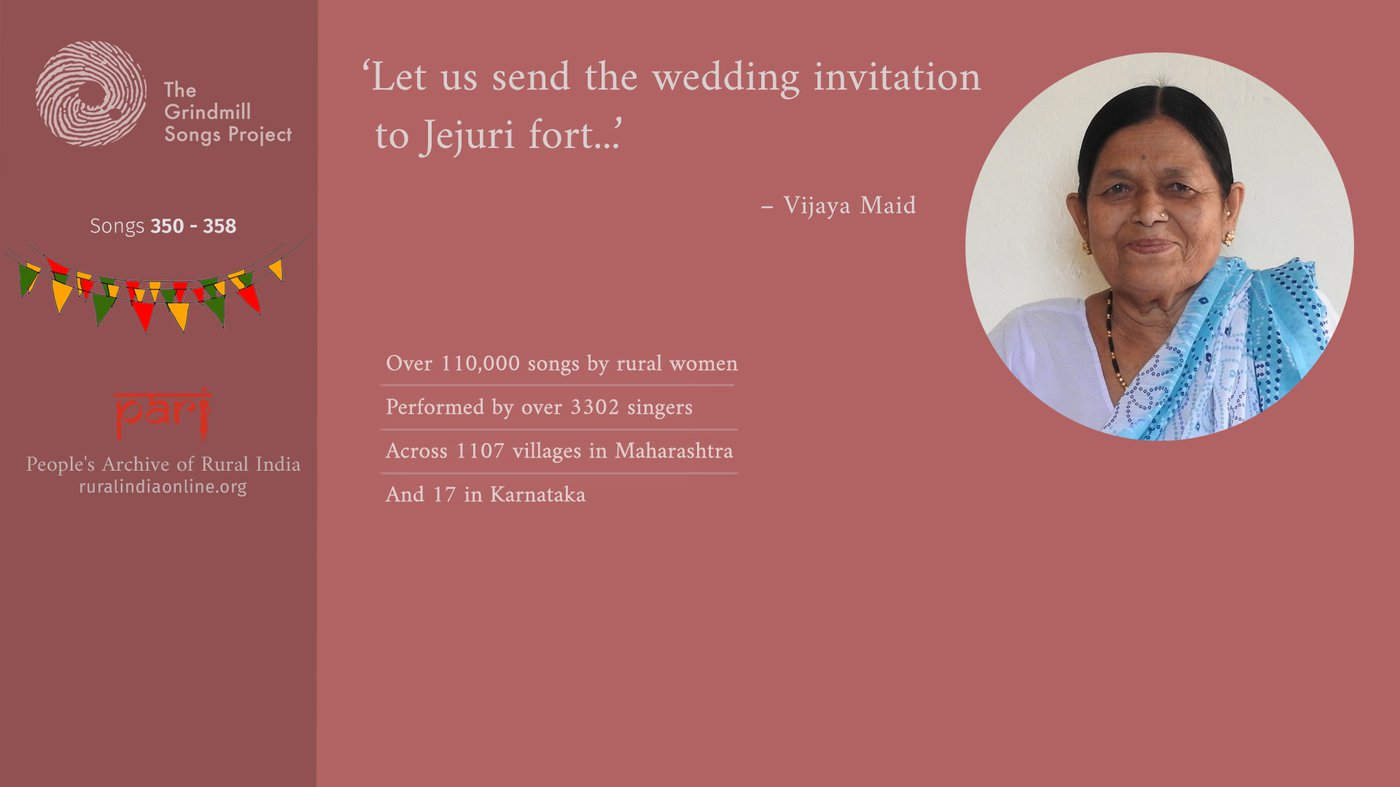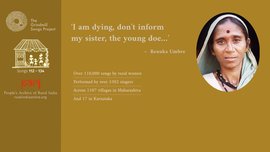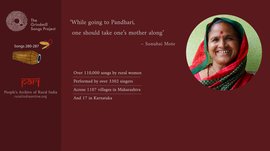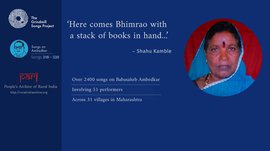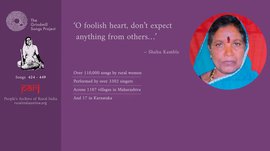Vijaya Maid, from Shirur town in Pune district, sings nine ovi inviting her favourite deities to a family wedding – and her songs paint a vivid picture of the scenes from the joyous event
“I know a few songs, why don’t you take them too?” Vijaya Maid said to Jitendra Maid, her college-going son, when she got to know that he was going village to village collecting grindmill songs. The “few songs” turned out to be 173 – that's the number of ovi she contributed to the Grindmill Songs Project (GSP).
Jitendra was a part of the original GSP team that had collected over a lakh
jatyavarchya
ovya
(grindmill songs) in the 1990s. The singers, all women, were from mostly Maharashtra and a few from Karnataka. (Jitendra has continued as a member of the GSP team, now at PARI, where he assists Ashatai
Ogale in translating the
ovi
from Marathi into English.)
“I
studied only till
saatvi
(Class 7), but all my children are educated and are
either self-employed or hold jobs,” said Vijayabai, now 80, when we met at Jitendra’s
home in Pune three years ago. She was happy to sing some grindmill songs for us, but was finding it difficult to remember the lines at first. She recollected them with her son's help, and so we could record many songs.
Vijayabai learned grindmill songs from her mother and aunt – the songs have been handed down by women from generation to generation. She was the eldest of eight sisters and three brothers. The family lived in Palasdeo village, in Pune's Indapur taluka. S he had to work hard, said Vijayabai, both before and after she got married at 16.
Faith in god and the worship of deities, specially on auspicious occasions, is an integral part of Vijayabai’s life – like it is with many women in Maharashtra
After she got married, Vijayabai moved to Shirur, a taluka town in Pune district. Kantilal Maid, her husband, worked as a mapadi (weighman) at the local agricultural produce market. He worked at a ration shop in the evenings, for which he was paid in millets – five kilos of jowar or bajra every week.
It was difficult to cover the household expenses of a growing family with the little money he brought home. “My mother started working for a tobacco factory in Shirur. She would bring home loose tobacco to pack into small sachets,” remembered Jitendra. He and his siblings – five brothers and a sister – would help their mother. “We used the flame of a kerosene lamp to seal the packets.”
In
the 1980s, for delivering 1,000 packets, Vijayabai earned 12
anna
(75
paise). This work brought the household’s income up to about Rs. 90 every month. To contribute to the finances, Jitendra
and his brothers did odd jobs like selling vegetables and distributing
newspapers while attending school.
Like it is with many women in Maharashtra, faith in god and the worship of deities, specially on auspicious occasions, is an integral part of Vijayabai’s life. In this instalment of GSP, her nine ovi , are an invitation to gods and goddesses to attend a family wedding. It is a tradition in many Hindu families to invite the family deity first, before relatives and friends. The invitation card is placed in front of the deity’s icon to seek blessings for the bride and groom.
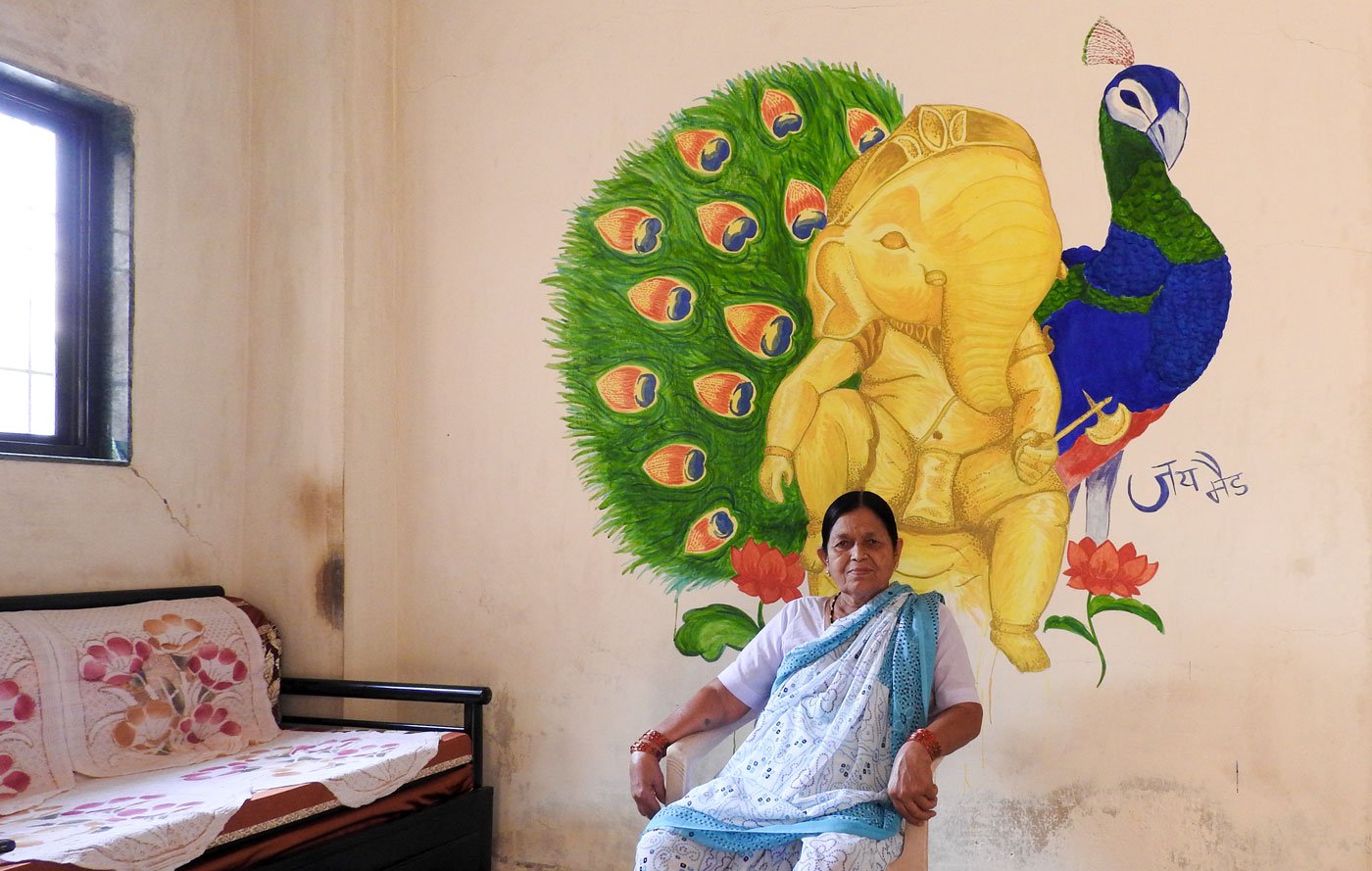
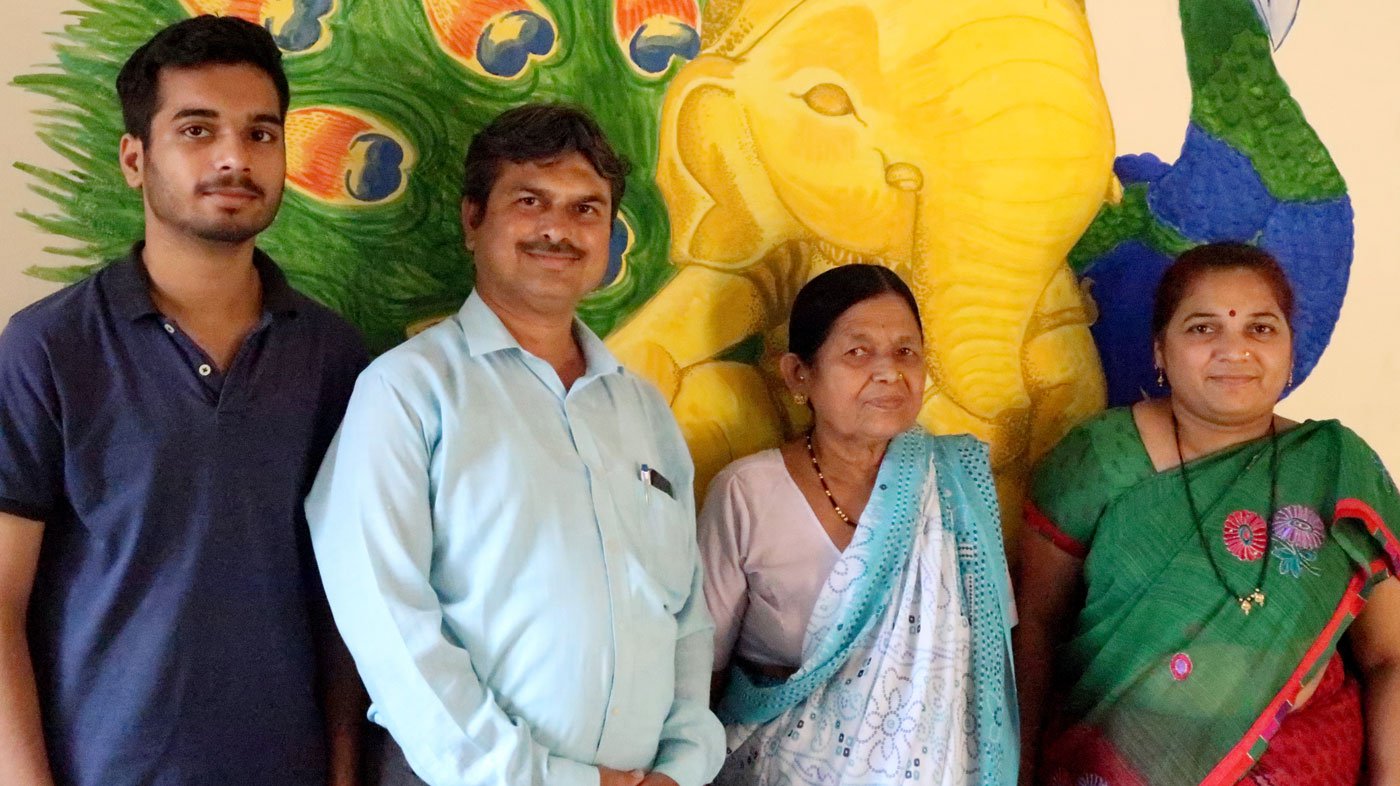
Left: Vijaya Maid at her son's home in Pune. Right: Vijayabai with her son Jitendra (in blue shirt), daughter-in-law Sonali (right) and grandson Yash
In these ovi , the singer invites Khandoba (or Khanderao) and his consort Mhalsa – deities of the temple at Jejuri fort – to join the varhadi , the marriage party. The goddess of Tuljapur temple, Ambabai (or Ambika), whose chariot is drawn by tigers, is invited too. The singer prays to Ganaraj (or Ganapati) to bless the new clothes purchased for the joyous occasion. She says that the wedding pandal's poles must be wide enough to make room for the bolster on which Ganaraj will recline.
The narrator paints a vivid picture of the wedding-day scenes. The Brahmin man performing the ceremony is told to not create problems, because otherwise “people will gossip about my dear daughter.” The ground outside the pandal is slushy because the bride’s father bathes there for a ritual. Though clothes are expensive in the wedding season, the narrator tells her brother, the bridegroom’s mother must be gifted a sari. On the wedding day, hammocks made from saris cradle the babies of the bride's sisters – they are all young mothers, the singer says.
In the last ovi , the singer once more invites Ganaraj to the family wedding and urges him to bring Goddess Sharada with him. She also requests the god to bring new saris when he comes, implying that the clothes bought for the wedding are the blessings of Lord Ganapati.
लग्नाची बाई चिठ्ठी गड जेजुरी जाऊ द्या
खंडेराव
म्हाळसा मूळ वऱ्हाडी येऊ द्या
लग्नाची
चिठ्ठी माझी तुला अंबाबाई
पातळाचे बाई घोळ गणराज तुझ्या पायी
लगनाची
चिठ्ठी तुळजापुरच्या लाडीला
आई आंबिकेने
वाघ जुंपले गाडीला
लग्नाची चिठ्ठ
नको मोडू बामन भटा
मैनाच्या माझ्या
बाई उपर नवरीचा बोभाटा
लग्नाच्या
दिवशी चिखल कश्याचा झाला
पूजा ना गं मैनाचा बाप नवरीचा न्हाला
लग्न गं सराई कापडाला मोल झालं
बहिण गं वरमाई
बंधु तुला घेणं आलं
मांडवाच्या
मेडी तुम्ही दूर दूर सारा
देवा गणपती
च्या लोडाला जागा करा
लग्नाच्या
दिवशी कश्या खांबो खांबी झोळ्या
नवरीच्या माझ्या बाई बहिणीच्या लेकुरवाळ्या
मांडवाच्या दारी गणराज तुम्ही यावा
पातळाचे घोळ संगे शारदाला घ्यावा
lagnācī
baee ciṭhṭhī gaḍa jējurī jāū dyā
khaṇḍērāva
mhāḷasā muḷa varhāḍī yēū dyā
pātaḷācē baee ghōḷa mājhē tujhyā pāyī
laganācī
ciṭhṭhī tuḷajāpuracyā gāḍīlā
āī
āmbīkēnē vāgha jumpalē gāḍīlā
lagnācī
citta nakō mōḍū bāmana bhaṭā
mainācyā
mājhyā bā'ī upanavarīcyā bōbhāṭā
lagnācyā divaśī cikhala kaśyācā jhālā
pūjā nā ga mainācā bāpa navarīcā nhālā
lagīna
sarāī kāpaḍālā mōla jhāla
bahiṇa
ga varamāī bandhu tulā ghēṇa āla
māṇḍavācyā
mēḍī tumhī dura dura sārā
dēvā gaṇapatī cyā lōḍālā jāgā karā
lagnācyā
divaśī kaśyā khāmbō khāmbī jhōḷyā
navarīcyā
mājhyā bā'ī bahiṇīcyā lēkuravāḷyā
pātaḷācē ghōḷa saṅgē śāradālā ghyāvā
Let us send the wedding
invitation to Jejuri fort
I will invite Khanderao and Mhalsa to join the
marriage party
A wedding invitation from me to
you, Goddess Ambabai
I place new saris at your feet, Lord Ganaraj, for your
blessings
Goddess Ambika has tied tigers to her chariot
Brahman, the wedding invitations have been sent; don’t
create any problems now
People will gossip about my dear daughter – the bride-to-be
On the wedding day, why is the
ground so slushy?
The bride Pooja’s father has had a bath
It’s the marriage season,
clothes have become expensive
For your sister – the bridegroom’s mother – you must buy [a
sari] dear brother
Keep the poles of the marriage
pandal at a fair distance
Make space for Lord Ganapati’s bolster
On the wedding day, hammock cradles
hang from pole after pole
The bride’s sisters are all young mothers
I invite you, Ganaraya, to a
wedding in my family
Bring new saris and bring Sharada too
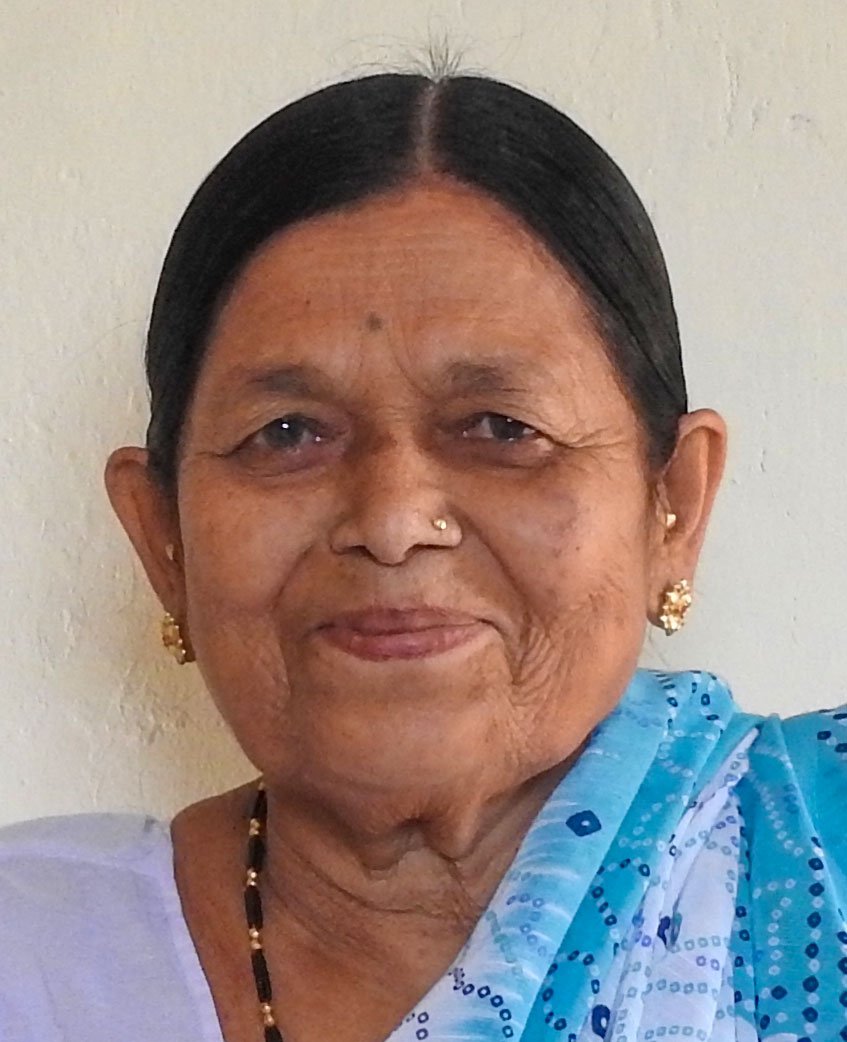
Performer/Singer : Vijaya Maid
Village : Shirur
Taluka : Shirur
District : Pune
Caste : Sonar (goldsmith)
Date : The singer’s video and songs were recorded on October 8, 2018
Poster: Urja
Read about the original Grindmill Songs Project founded by Hema Rairkar and Guy Poitevin.
